 Mitsubishi Outlander: Reversing sensor system*
Mitsubishi Outlander: Reversing sensor system*
This system operates when you are backing the vehicle. It uses corner and back sensors to detect an obstacle and sounds a buzzer to inform you of the approximate distance to the obstacle.
CAUTION:
● The reversing sensor system assists you in determining the approximate distance
between the vehicle and an obstacle located behind the vehicle. It has limitations
in terms of detectable areas and objects, and may not properly detect some objects.
Therefore, do not place excessive confidence in the reversing sensor system, and
operate the vehicle as carefully as you would a vehicle without this system.
● Make sure to check the surroundings with your own eyes to ensure safety. Do not
operate the vehicle by relying on the reversing sensor system alone.
Obstacle detection areas
The detection areas of the corner and back sensors are limited to those shown in the illustration. Moreover, the sensors are unable to detect low or thin objects or objects near the rear bumper. Thus, make sure to check the surroundings as you operate the vehicle in a safe manner.
Corner and back sensor locations
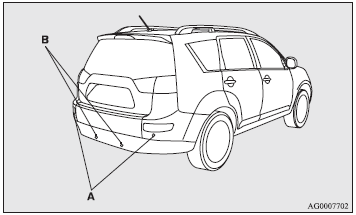
There are two corner sensors (A) at the corners of the rear bumper, and two back sensors (B) in the centre of the rear bumper.
Reversing sensor system detection areas
Depending on whether the vehicle is equipped with a towbar, you can change the reversing sensor system between the standard mode and the towbar mode. The towbar mode changes the system to exclude the area in which the towbar is mounted from the detection areas.
Vehicles without a towbar
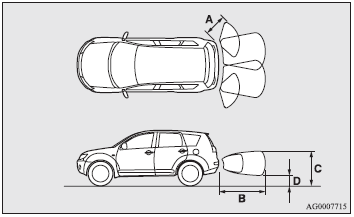
The detection areas are within approximately 60 cm (A) from the corner sensors, 150 cm (B) from the back sensors, and 60 cm (C) or less from the ground surface, excluding the area approximately 10 cm (D) from the ground surface.
Vehicles with a towbar
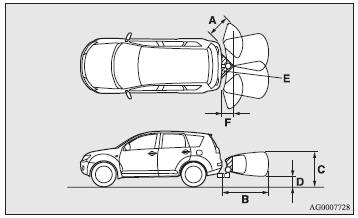
The detection areas are within approximately 60 cm (A) from the corner sensors, 150 cm (B) from the back sensors, and 60 cm (C) or less from the ground surface, excluding the area approximately 10 cm (D) from the ground surface. The nondetection areas (E) are within approximately 20 cm (F) from the bumper.
NOTE:
● If the rear bumper has been exposed to an impact, the corner or back sensors may
fail and prevent the system from functioning properly. Have the vehicle inspected
at a MITSUBISHI MOTORS Authorised Service Point.
● The sensors do not detect objects located in the area directly below or near the
bumper. If the height of an object is lower than the mounted position of the corner
or back sensors, the sensors may not continue detecting it even if they detected
it initially. For information on how to change the detection areas, please refer
to “Changing the detection areas” on page 4-52.
CAUTION:
● The reversing sensor system may not operate properly under the following conditions:
• The sensors or surroundings are covered with ice, snow, or mud. • The sensors
are frozen. • The system receives ultrasonic noise from other sources (the horns
of other vehicles, motorcycle engines, brakes, radios, pouring rain, splashing water,
tyre chains, etc.). • The sensors are extremely hot or cold (while the vehicle is
parked for a long period of time under a blazing sun or in cold weather). • The
vehicle tilts significantly. • The vehicle is driven on a rough road (with a bumpy,
gravel, hilly, or grassy surface). • The vehicle is too close to an obstacle. •
The sensors or surroundings have been wiped by hand, or stickers or accessories
have been attached.
● The reversing sensor system may not properly detect the following: • Objects that
are thin, such as wire nets or ropes. • Objects that absorb sound waves, such as
snow. • Objects that are shaped with a sharp angle. • Objects with a smooth surface,
such as glass. • Objects that are low, such as kerbstones.
NOTE:
● The buzzer may sound lower than the normal warning sound when the reversing sensor
system is receiving ultrasonic noise from other sources, but this is not a malfunction.
The buzzer will stop sounding and the system will return to normal operation after
the noise is no longer received.
To operate
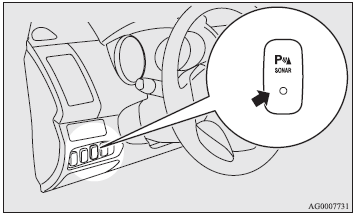
To operate the system, move the gearshift lever to the “R” (Reverse) position while the ignition switch is in the “ON” position. To stop the operation, push the “SONAR” switch.
NOTE:
● Only when the gearshift lever is in the “R” (Reverse) position, the reversing
sensor system can be operated or be stopped by using the “SONAR” switch. The reversing
sensor system operation indicator lamp (A) will turn off that the system has stopped
operating. It will flash in case there is a malfunction in the system. For details,
refer to “Reversing sensor system operation indicator lamp” on page 4-52.
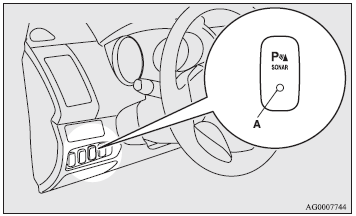
To return the system to the operating state, push the “SONAR” switch again. When the system returns to the operating state, the buzzer sounds once and the indicator lamp illuminates.
NOTE:
● The reversing sensor system operation indicator lamp flashes once when the ignition
switch is turned to the “ON” position.
The warning buzzer sounds when the system detects an obstacle during operation.
NOTE:
● After pushing the “SONAR” switch, reversing sensor system operation differs according
to the detection area setting. • Setting when towbar is not equipped When the gearshift
lever is moved to the “R” (Reverse) position, the reversing sensor system will operate
even if corner sensor operation was stopped by pushing the “SONAR” switch. • Setting
when towbar is equipped When reversing sensor system operation was stopped by pushing
the “SONAR” switch, the reversing sensor system will not operate until the engine
has been stopped even if the gearshift lever is moved to the “R” (Reverse) position.
To resume reversing sensor system operation, push the “SONAR” switch or stop and
restart the engine, and then move the gearshift lever to the “R” (Reverse) position.
Warning for obstacles
If there is an obstacle behind the vehicle, a warning buzzer sounds to indicate the distance between the vehicle and the obstacle.
Corner sensor

Back sensor (vehicles without a towbar)

Back sensor (vehicles with a towbar)

CAUTION:
● The distances given are to be used for reference only, as errors may be caused
by various factors, such as temperature, humidity, or the shape of the obstacles.
Changing the detection areas
The detection areas can be changed as follows:
Vehicles with a towbar
While the operation of the system is stopped at the “SONAR” switch, push the “SONAR” switch approximately 3 seconds or more, and release it. The buzzer sounds twice to indicate that the detection area has been changed.
Vehicles without a towbar
While the operation of the system is stopped at the “SONAR” switch, push the “SONAR” switch approximately 3 seconds or more, and release it. The buzzer sounds once to indicate that the detection area has been changed.
NOTE:
● The detection area will not change if you keep the “SONAR” switch pushed for 10
seconds or more.
Reversing sensor system operation indicator lamp
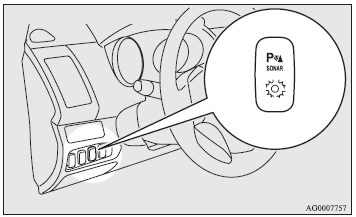
In case there is a malfunction in the reversing sensor system, the reversing sensor system operation indicator lamp will blink and the warning buzzer will sound for approximately 5 seconds. Even after the buzzer has stopped sounding, the indicator lamp will continue blinking until the system reverts to the normal state. Have the vehicle inspected at a MITSUBISHI MOTORS Authorised Service Point.
 Cruise control*
Cruise control*
Cruise control is an automatic speed control system that lets you keep the same
driving speed. It can be activated at 40 km/h (25 mph) or more.
CAUTION:
● When you do not wish to drive at a ...
 Cargo loads
Cargo loads
Cargo loads precautions
CAUTION:
● Do not load cargo or luggage higher than the top of the seatback. Be sure that
your cargo or luggage cannot move once your vehicle is moving. Having the r ...
See also:
Passenger side cargo compartment
Your vehicle is equipped with a passenger side cargo compartment
located in the right rear trim panel which is used to store small items
and may have the Easy Fuel™ white plastic funnel attached o ...
Easy entry/exit
When Easy entry/exit is configured, the driver’s
seat will automatically lower when the ignition
is switched off and the door release lever is
used. Upon returning to the vehicle, when the
drive ...
Engine Coolant Temperature Gauge
Metric
English
This gauge measures the temperature of the vehicle's engine. If the indicator
needle moves to the hot side of the gauge toward the colored line, the engine is
too hot. If ...
